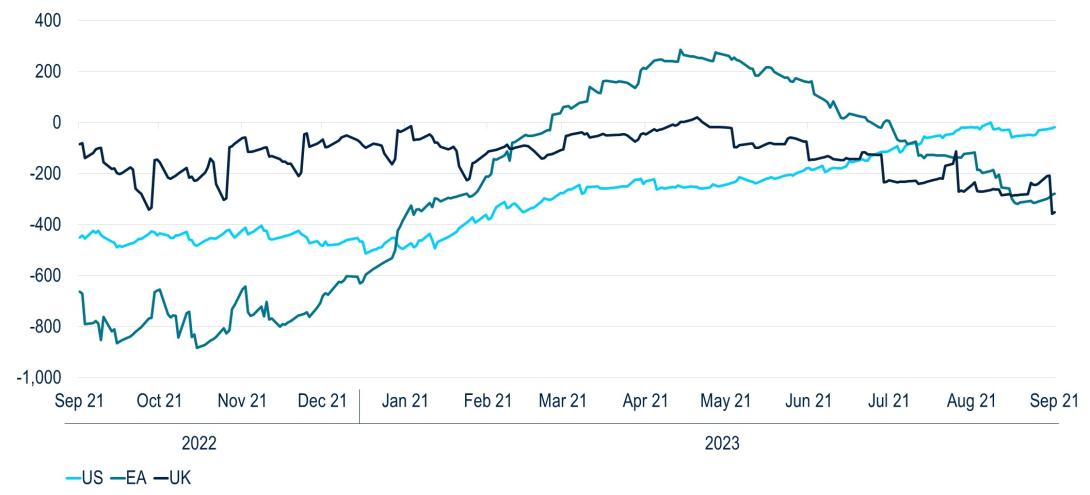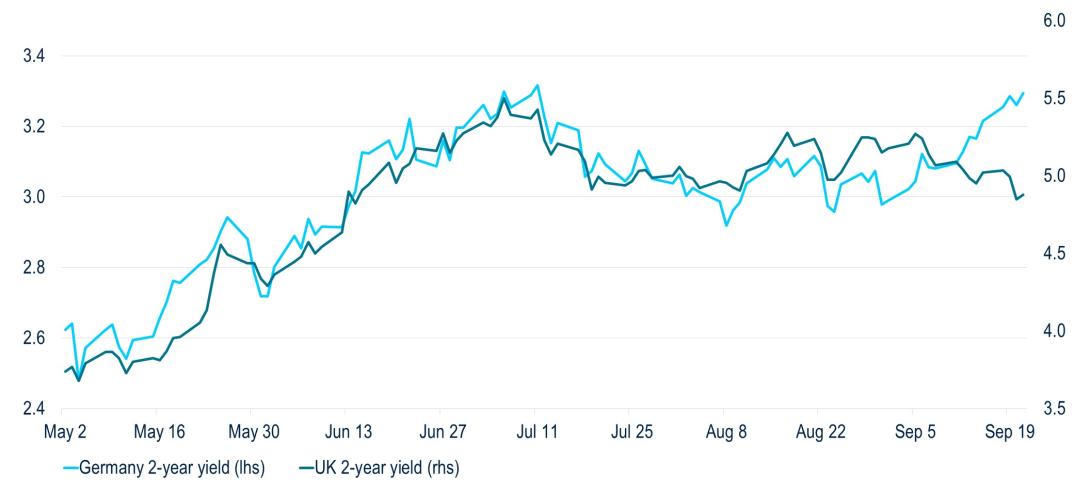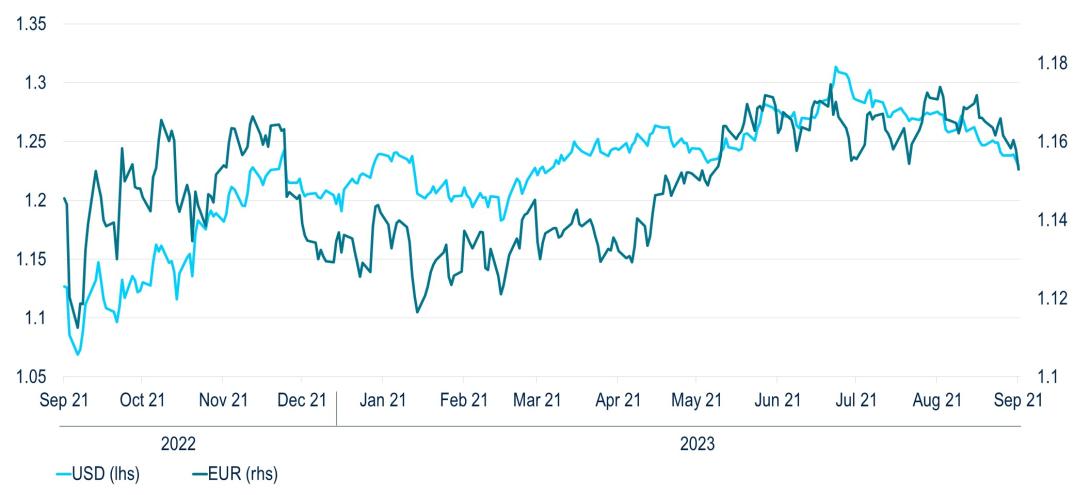The BoE's "Table Mountain" Approach Sees Rates Highest for Longest

The Bank of England (BoE) kept its Bank Rate on hold at 5.25% today. The UK’s economic backdrop is weak, so we believe that the BoE will keep interest rates at this level for the near future.
The BoE’s “hold” may protect the UK economy, and it may support prices for government bonds and risk assets such as corporate debt. But if it hurts the pound sterling, today’s decision could raise consumer price inflation, which is sensitive to the exchange rate.
Our Take on the Meeting
Given the elevated inflation backdrop, we’re somewhat surprised that the BoE kept interest rates on hold. This is the BoE’s second dovish signal, after it stepped back from 0.50 percentage point (pp) hikes to a 0.25 pp hike at its previous meeting.
Granted, recent data points to a weakening economy and a softening nominal environment. That said, today seemed to us like the most dovish statement and decision that has recently come out of a major central bank. The BoE gave little, if any, forward guidance, nor the conviction that rates might go higher if inflation remains high. Instead, it emphasized the following factors behind its decision:
- Inflation is falling faster than expected, but services inflation can be volatile.
- The BoE recalled that its latest projections, conditioned on a market-implied path for Bank Rate to 5.5%, showed inflation in the medium term falling below its target of 2%.
- Pass-through from previous rate hikes is yet to be fully felt in the real economy, which is visibly weakening – and fast.
- Wage growth was “stabilising” on alternative measures to average weekly earnings (AWE), which is key data on wage growth.
- Material weakening in the labor market would likely only happen with a significant delay.
All this suggests that inflation and policy rates in the UK will remain high for some time. Alongside higher rates for longer, the BoE increased the pace of its balance sheet runoff, in line with expectations, to £100 billion from October over the next 12 months. The BoE noted that the impact of quantitative tightening (QT) has been “modest,” but that QT is contributing to tighter financial conditions at the margin.
The BoE’s latest policy decisions lack a signal that Bank Rate could rise again, and immediate economic data is likely to continue to come in weaker. As a result, our view is that the BoE will not raise Bank Rate at its next meeting, but keep it on hold at 5.25% for the foreseeable future.
Further inflation shocks may hit, including through a weaker pound sterling, given that consumer prices are sensitive to the exchange rate. In that case, the BoE may need to resume chasing inflation through higher rates. Its “Table Mountain” approach to monetary policy contrasts with the European Central Bank’s “Matterhorn” approach, which probably leaves the BoE “highest for longest” among central banks in developed markets.
Investor Reaction
Keeping rates on hold was a tricky bet for the BoE. This week’s downside surprise in UK services inflation allowed the BoE to be cautious, especially given weaker growth. At the same time, the inflation fight doesn’t end here. The UK economy continues to face high wage inflation and a low unemployment rate.
Today’s BoE hold contrasts with the ECB’s hike last week. Both central banks face challenging growth prospects and high inflation, but the ECB delivered a "dovish hike." To make things even more interesting, the Fed offered a different flavor by delivering a "hawkish pause" on September 20.
From investors’ perspective, the BoE’s hold raises three interesting points. First, all three central banks are approaching the end of their aggressive tightening cycles. Second, each of them has been comfortable signaling that policy rates may need to stay “higher for longer” to ensure inflation stays under control. Third, they each face markedly different growth backdrops. In the U.S., economic momentum has been strong until recently, but the opposite has been true in the UK and the euro area, where growth momentum has been weakening since May (Figure 1).
Figure 1: Activity has weakened in the UK and the euro area, but it has remained strong in the U.S.

Source: Citi. Citi data change indices measure data momentum. Higher/lower values indicate stronger/weaker momentum in the preceding three months, relative to the preceding 12 months.
This has important implications for investors.
Starting with government bond markets, the bar for central banks to embark on rate cuts is high. This means that short-dated interest rates support longer-dated bond yields. Government bond issuance in the U.S., the UK, and the euro area, as well as increased macroeconomic uncertainty, will probably keep term premia high at the longer-dated end of these governments’ yield curves. This situation makes calling the next directional move difficult. But the good news is that investors are no longer starved for yields, as before the pandemic.
An important difference, mentioned above, is that the UK’s growth backdrop, along with that in the euro area, is much weaker than in the U.S. The BoE has been looking to pause, so gilt yields are off their cyclical highs. This is different to German Bund yields: those remain close to their cyclical highs, mainly because the more hawkish ECB is restricted by its inflation-targeting mandate.
Figure 2 shows the unusual divergence at the short-dated end of the UK and German yield curves. Given the euro area’s weak growth prospects, the short-dated end of the German yield curve looks high to us. The U.S. Treasury market sets the global tone for rates, so the Fed’s hawkish message only makes the situation worse for core euro area bond yields.
Figure 2: Two-year German Bund yields have stayed close to their cyclical highs but two-year gilt yields in the UK have fallen recently. (%)

Source: Bloomberg
Risk assets are also in a tricky spot. After aggressive policy tightening, the BoE’s pause seeks to protect growth. This may help risk assets at the margin, but it hurts the pound sterling, relative to currencies supported by high interest rates such as the U.S. dollar and the euro (Figure 3). Add to this the UK’s modest growth prospects, and sterling faces even more trouble.
Figure 3: Lower UK yields have led to a weaker sterling, relative to the euro and the U.S. dollar.

Source: Bloomberg
As for euro area risk assets such as corporate debt: investors in these assets have gotten used to the combination of lackluster growth, lower volatility (helped by the inflation fight), and scarce issuance. But one factor that investors have swept under the carpet is the lagged effect of monetary policy. The ECB’s further tightening last week was a wake-up call.
Read More From PGIM Fixed Income
The comments, opinions, and estimates contained herein are based on and/or derived from publicly available information from sources that PGIM Fixed Income believes to be reliable. We do not guarantee the accuracy of such sources or information. This outlook, which is for informational purposes only, sets forth our views as of this date. The underlying assumptions and our views are subject to change. Past performance is not a guarantee or a reliable indicator of future results.
Source(s) of data (unless otherwise noted): PGIM Fixed Income, as September 21, 2023.
For Professional Investors only. Past performance is not a guarantee or a reliable indicator of future results and an investment could lose value. All investments involve risk, including the possible loss of capital.
PGIM Fixed Income operates primarily through PGIM, Inc., a registered investment adviser under the U.S. Investment Advisers Act of 1940, as amended, and a Prudential Financial, Inc. (“PFI”) company. Registration as a registered investment adviser does not imply a certain level or skill or training. PGIM Fixed Income is headquartered in Newark, New Jersey and also includes the following businesses globally: (i) the public fixed income unit within PGIM Limited, located in London; (ii) PGIM Netherlands B.V., located in Amsterdam; (iii) PGIM Japan Co., Ltd. (“PGIM Japan”), located in Tokyo; (iv) the public fixed income unit within PGIM (Hong Kong) Ltd. located in Hong Kong; and (v) the public fixed income unit within PGIM (Singapore) Pte. Ltd., located in Singapore (“PGIM Singapore”). PFI of the United States is not affiliated in any manner with Prudential plc, incorporated in the United Kingdom or with Prudential Assurance Company, a subsidiary of M&G plc, incorporated in the United Kingdom. Prudential, PGIM, their respective logos, and the Rock symbol are service marks of PFI and its related entities, registered in many jurisdictions worldwide.
These materials are for informational or educational purposes only. The information is not intended as investment advice and is not a recommendation about managing or investing assets. In providing these materials, PGIM is not acting as your fiduciary. PGIM Fixed Income as a general matter provides services to qualified institutions, financial intermediaries and institutional investors. Investors seeking information regarding their particular investment needs should contact their own financial professional.
These materials represent the views and opinions of the author(s) regarding the economic conditions, asset classes, securities, issuers or financial instruments referenced herein. Distribution of this information to any person other than the person to whom it was originally delivered and to such person’s advisers is unauthorized, and any reproduction of these materials, in whole or in part, or the divulgence of any of the contents hereof, without prior consent of PGIM Fixed Income is prohibited. Certain information contained herein has been obtained from sources that PGIM Fixed Income believes to be reliable as of the date presented; however, PGIM Fixed Income cannot guarantee the accuracy of such information, assure its completeness, or warrant such information will not be changed. The information contained herein is current as of the date of issuance (or such earlier date as referenced herein) and is subject to change without notice. PGIM Fixed Income has no obligation to update any or all of such information; nor do we make any express or implied warranties or representations as to the completeness or accuracy.
Any forecasts, estimates and certain information contained herein are based upon proprietary research and should not be interpreted as investment advice, as an offer or solicitation, nor as the purchase or sale of any financial instrument. Forecasts and estimates have certain inherent limitations, and unlike an actual performance record, do not reflect actual trading, liquidity constraints, fee. These materials are not intended as an offer or solicitation with respect to the purchase or sale of any security or other financial instrument or any investment management services and should not be used as the basis for any investment decision. PGIM Fixed Income and its affiliates may make investment decisions that are inconsistent with the recommendations or views expressed herein, including for proprietary accounts of PGIM Fixed Income or its affiliates.
Investing in the bond market is subject to risks, including market, interest rate, issuer, credit, inflation risk, and liquidity risk. The value of most bonds and bond strategies are impacted by changes in interest rates. Bonds and bond strategies with longer durations tend to be more sensitive and volatile than those with shorter durations; bond prices generally fall as interest rates rise, and low interest rate environments increase this risk. Reductions in bond counterparty capacity may contribute to decreased market liquidity and increased price volatility. Bond investments may be worth more or less than the original cost when redeemed. Mortgage- and asset-backed securities may be sensitive to changes in interest rates, subject to early repayment risk, and while generally supported by a government, government agency or private guarantor, there is no assurance that the guarantor will meet its obligations. High yield, lower-rated securities involve greater risk than higher-rated securities; portfolios that invest in them may be subject to greater levels of credit and liquidity risk than portfolios that do not. Investing in foreign-denominated and/or -domiciled securities may involve heightened risk due to currency fluctuations, and economic and political risks, which may be enhanced in emerging markets. Currency rates may fluctuate significantly over short periods of time and may reduce the returns of a portfolio. Commodities contain heightened risk, including market, political, regulatory and natural conditions, and may not be suitable for all investors. Diversification does not ensure against loss.
In the United Kingdom, information is issued by PGIM Limited with registered office: Grand Buildings, 1-3 Strand, Trafalgar Square, London, WC2N 5HR. PGIM Limited is authorised and regulated by the Financial Conduct Authority (“FCA”) of the United Kingdom (Firm Reference Number 193418). In the European Economic Area (“EEA”), information is issued by PGIM Netherlands B.V., an entity authorised by the Autoriteit Financiële Markten (“AFM”) in the Netherlands and operating on the basis of a European passport. In certain EEA countries, information is, where permitted, presented by PGIM Limited in reliance of provisions, exemptions or licenses available to PGIM Limited under temporary permission arrangements following the exit of the United Kingdom from the European Union. These materials are issued by PGIM Limited and/or PGIM Netherlands B.V. to persons who are professional clients as defined under the rules of the FCA and/or to persons who are professional clients as defined in the relevant local implementation of Directive 2014/65/EU (MiFID II). In certain countries in Asia-Pacific, information is presented by PGIM (Singapore) Pte. Ltd., a Singapore investment manager registered with and licensed by the Monetary Authority of Singapore. In Japan, information is presented by PGIM Japan Co. Ltd., registered investment adviser with the Japanese Financial Services Agency. In South Korea, information is presented by PGIM, Inc., which is licensed to provide discretionary investment management services directly to South Korean investors. In Hong Kong, information is provided by PGIM (Hong Kong) Limited, a regulated entity with the Securities & Futures Commission in Hong Kong to professional investors as defined in Section 1 of Part 1 of Schedule 1 (paragraph (a) to (i) of the Securities and Futures Ordinance (Cap.571). In Australia, this information is presented by PGIM (Australia) Pty Ltd (“PGIM Australia”) for the general information of its “wholesale” customers (as defined in the Corporations Act 2001). PGIM Australia is a representative of PGIM Limited, which is exempt from the requirement to hold an Australian Financial Services License under the Australian Corporations Act 2001 in respect of financial services. PGIM Limited is exempt by virtue of its regulation by the FCA (Reg: 193418) under the laws of the United Kingdom and the application of ASIC Class Order 03/1099. The laws of the United Kingdom differ from Australian laws. In Canada, pursuant to the international adviser registration exemption in National Instrument 31-103, PGIM, Inc. is informing you that: (1) PGIM, Inc. is not registered in Canada and is advising you in reliance upon an exemption from the adviser registration requirement under National Instrument 31-103; (2) PGIM, Inc.’s jurisdiction of residence is New Jersey, U.S.A.; (3) there may be difficulty enforcing legal rights against PGIM, Inc. because it is resident outside of Canada and all or substantially all of its assets may be situated outside of Canada; and (4) the name and address of the agent for service of process of PGIM, Inc. in the applicable Provinces of Canada are as follows: in Québec: Borden Ladner Gervais LLP, 1000 de La Gauchetière Street West, Suite 900 Montréal, QC H3B 5H4; in British Columbia: Borden Ladner Gervais LLP, 1200 Waterfront Centre, 200 Burrard Street, Vancouver, BC V7X 1T2; in Ontario: Borden Ladner Gervais LLP, 22 Adelaide Street West, Suite 3400, Toronto, ON M5H 4E3; in Nova Scotia: Cox & Palmer, Q.C., 1100 Purdy’s Wharf Tower One, 1959 Upper Water Street, P.O. Box 2380 - Stn Central RPO, Halifax, NS B3J 3E5; in Alberta: Borden Ladner Gervais LLP, 530 Third Avenue S.W., Calgary, AB T2P R3.
© 2023 PFI and its related entities.
2023-6863
Sign Up Now for Full Access to Articles and Podcasts!
Unlock full access to our vast content library by registering as an institutional investor .
Create an accountAlready have an account ? Sign in
